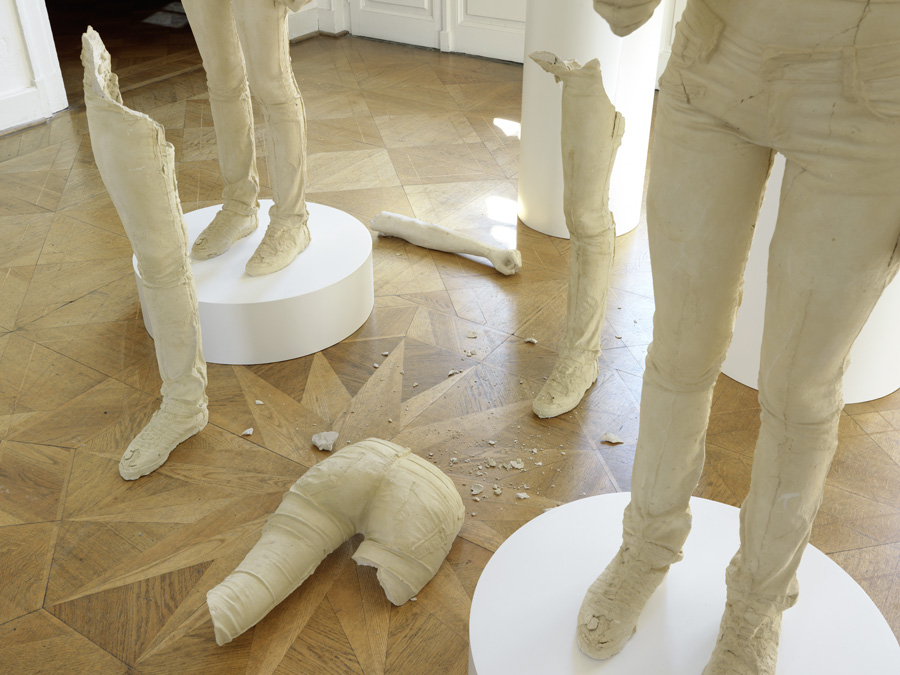Simon Fujiwara | Riots, China, Meerkats, etc.
Keywords: china, disillusioned, England, Rebekkah, Sarah Lookofsky, Shanghai Biennale, simon fujiwara, terra cotta
A conversation with the artist Simon Fujiiwara about his recent film, Rebekkah.
Sarah Lookofsky Rebekkah (An Education), 2013, begins with the 2011 riots in Britain, with news reports of looting and vandalism, before swooping off to visually stunning cityscapes of China and factories where consumer products are produced before finally terminating with the terra-cotta army, as both historical site and customizable simulacrum. There is a lot going on here. You are clearly interested in the dynamics of consumption and production on a global scale, and perhaps also revolt versus obedience, but this story of a teenage girl is an unusual protagonist for representing these massive themes. Please explain…
Simon Fujiwara The narrative does leap from one place and idea to another but this is to retain an ambiguity about its message and to decontextualize it, to make it a story does not appear to be too rooted to its context. The work might appear to be about a specific political situation or a general idea of consumption and production, but it is not in itself a political agent for change. It does not have a purpose in this sense because it is art. For this reason it is allowed to be confused about itself as a form and its voice attempts to reflect this: at times it is museum information video, it is reality TV drama, it is news… What makes it seem elaborate is the fact that this story, which is all about ‘finding meaning’ or a political position seems to have no clear meaning itself despite being quite a laborious and involved production.
When I was commissioned by the Shanghai Biennale to make a new work I was conflicted about what it meant to collaborate with the People’s Party of China–the ones who were paying for it–as an artist that was chosen to represent both their interests and mine. My aim was to act as a parasite or virus living within a host cell; feeding from it but retaining its own integrity as a life form and this is where the idea came from to make a work that both glorified and scrutinized not only China and its history but also Britain. Although I had never been to China before, I felt I knew it or a version of it through the media, which is currently obsessed with it. Similarly there was ‘Working Class Britain’—another kind of ‘foreign land’ that is often represented in brash reality TV shows in which the protagonists are largely ridiculed and pitied, yet became a sudden and less entertaining threat during the London riots in 2011—an invasion from within.
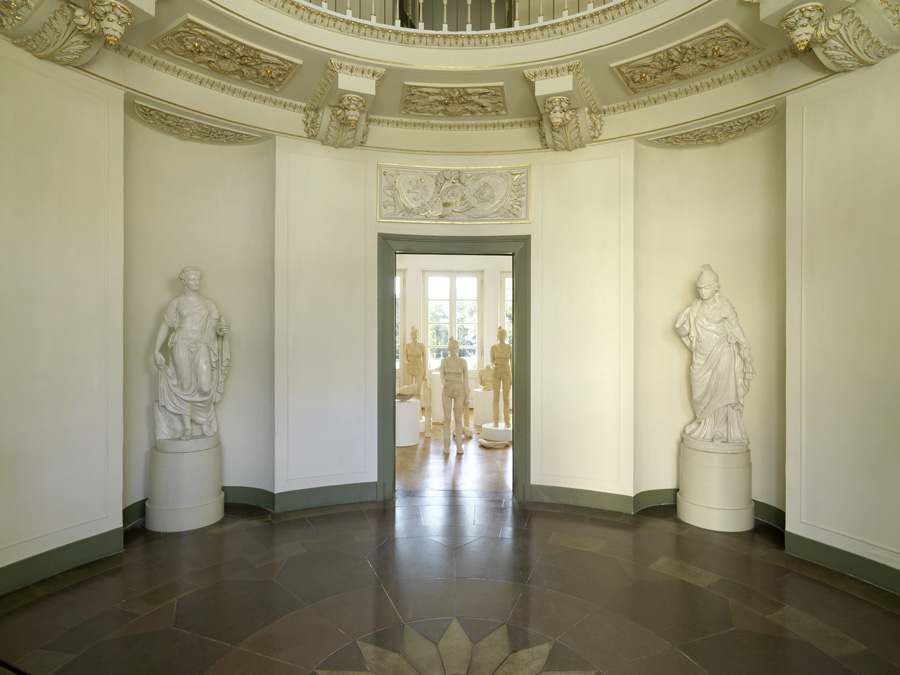
It’s not that I saw any real connection between China and working class England but I decided that I could create that connection and test it to see if it could be viable. It was rather like sitting down and writing my own reality TV plot and I very much had those predecessors in mind when I devised the trip. From the outset I wanted the work to sit in the tradition of ‘edutainment’—a phrase that I use to describe plays, films, TV shows that show a process of ‘educational transformation’ for entertainment purposes. My Fair Lady is a classic example—a British musical play in which a young working class lady with a ‘filfy maaf’ on her is taken in by two posh elocution teachers who bet on who can make her sound like an aristocrat. More recently we have ‘ASBO Teen to Beauty Queen’ – a show about poor young girls who are given a 6-week workshop by a true Beauty Queen winner. What interested me in these forms of entertainment was the illusory relationship between process and product. They all pretend that the product or goal—to create a ‘middle class person’—is the meaning of the show, but if this were the case we would witness how that person sustains this new persona in their life after, not how they got there. It should be about what the product does not how it is made, or at least both. But it is more entertaining of course to watch the protagonists (or should I call them prototypes?) attempt and fail. This is the spirit I wanted to capture in the project and again, to use the viral analogy, to inhabit this edutainment world with a version of my own. This is why, for example, the voiceover has a cloyingly cosy English tone and uses words like emotionally grueling. It seems to think it knows its audience.
SL But aren’t My Fair Lady and recent reality TV shows quite different in fact? My Fair Lady, and Pygmalion from which it was adopted, were about the recognition of a rigid class system and its cultural sedimentation, whereas recent TV adaptations about poor people (Teen Mom and the rest of it) only serve to mock and ridicule these “prototypes.”
SF Absolutely, but my intention in choosing those two examples was not to say they are totally the same, but how Rebekkah was influenced by these stories of ‘personal growth, development and education’ that appear in various forms of entertainment.
SL OK, but I think the distinction is an important one. This shift to me indicates a turn in culture, where the working class character is devoid of political agency, a character with whom no one is capable of identifying.
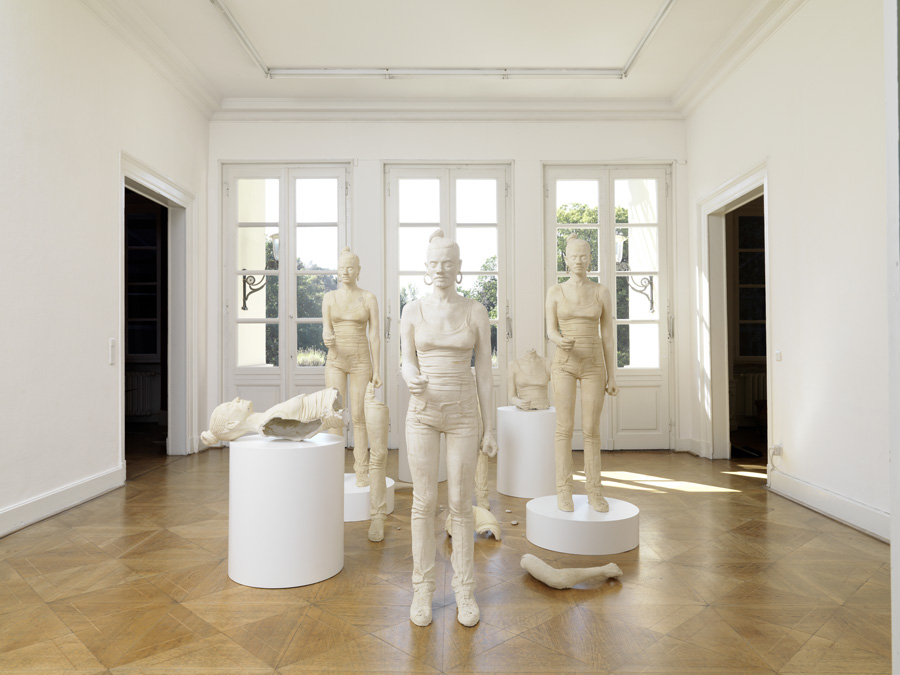
SF I had this very much in mind with Rebekkah and it was behind the idea to present her as a prototype. A person who represents other people but who we know nothing personal about, leaving the audience free to project onto their own expectations. That is why she never talks, we don’t see her eyes, we never see her react and we don’t really know what she thinks of the whole project, or indeed if she is real.
SL This question of identification brings me to the issue of address in your piece. If it mimes contemporary “docutainment,” what is the audience this form addresses, do you think?
SF When the piece was first shown in the Shanghai Biennale, it got a lot of attention because I presented it as a spectacle—a hundred figures, some smashed to pieces, ascending the main staircase as you entered the main museum building. It was so embarrassing, I couldn’t stand near the work or even look at it because to my mind it was exactly what you would imagine an artist working for the first time in China would want to do, if we think of clichés. The Chinese have a love of things in hundreds or thousands—I was staying in the Hundred Centuries Hotel eating Thousand Year Eggs for example. While I intended it to confront that cliché, it didn’t make it any less cringe worthy. Then, in a curious turn of events the museum in Shanghai prompted by the Chinese Government asked to acquire the entire work (along with a piece by Joseph Beuys?!) to represent the first ever contemporary art acquisitions for their national collection which, if it had happened, would have had a pleasing circularity to it. Who knows why they wanted it. The easy, cynical version is to say that since the work could be read as a kitschy easy game on their own historical national treasure then of course the Chinese would want it—it seems to celebrate their cultural heritage. But I stopped the acquisition when I realized they actually wanted me to donate the work to them and were blackmailing me with the threat of destroying the work if I didn’t.
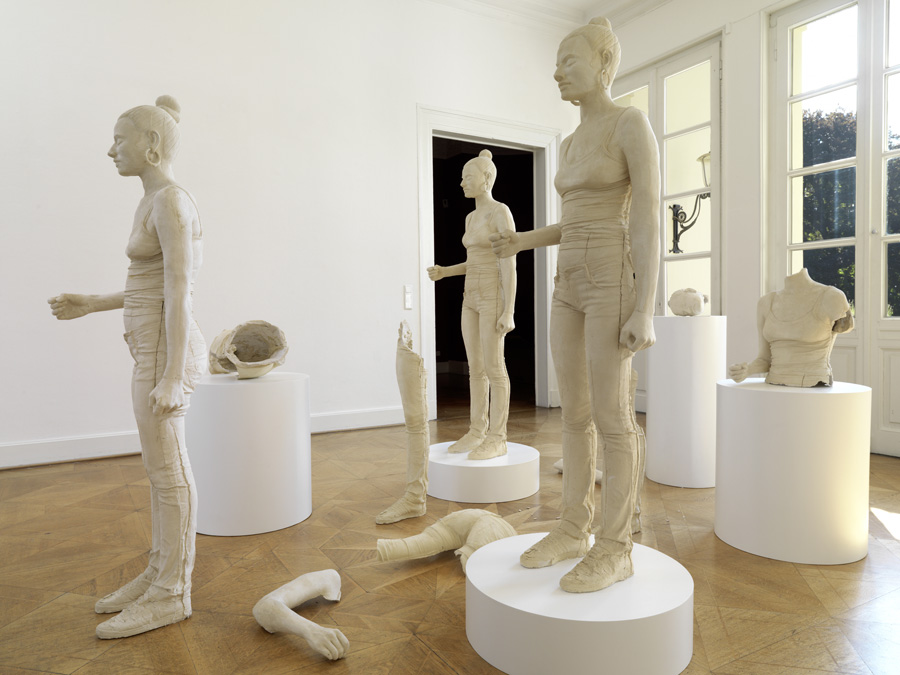
SL This story of exhibition and potential acquisition speaks further to the piece’s unwavering ambiguity. Its narrative and characters makes it capable of being all things to all people, in a way. So maybe it isn’t so surprising that the Chinese government was interested in acquiring it… But this brings me to ask who this Rebekkah figure is to you?
SF As far as Rebekkah goes, you are told that she is a real person yet you are not given any information visual or otherwise with which to engage with her as anything more than a model. You want her to exist to feel and react but then you meet her as a terracotta statue repeated again and again and she becomes an idea—a concept. Some of her figures are smashed and for a moment it seems to be a violent act, but then you see so much of it in pieces and you realize you are walking through a ruin and that becomes numbing. Because she is allowed to be so abstract Rebekkah is me and she is also you—she is all of us, because she, like China, like each one of us is so highly specific and so vastly general at the same time.
SL You are known for working through the autobiographical, but this is a departure from adopting that mode…
SF Three years after making my first works Facebook created the timeline, and it was then that I realized that I was not making an autobiography myself, that I was not looking for chronology and order but rather chaos and disruption of the narrative forces that are placed on us by a narrative obsessed world. I think of my work more and more like architecture, in that what I create are new structures, rules of a game, blueprints, rooms, corridors, spaces and scripts, in which people, actors, strangers, family members and yes, often myself, interact and create unexpected results—new life forms. This distinction between the personal/autobiographical and the public/political is a traditional binary notion that seems less and less relevant to me today. Although my work is littered with what appear to be personal anecdotes like ‘a relative of mine built the Titanic’ or ‘my grandmother was a Nazi living in Buenos Aires’ or ‘my parents escaped Iraq in a shipping container’ these anecdotes are not in themselves very interesting to me because I don’t want to believe in hierarchical history—that one fact is more valuable than another. These facts don’t become interesting to me until they become proto-personal, which is how I would describe my work.
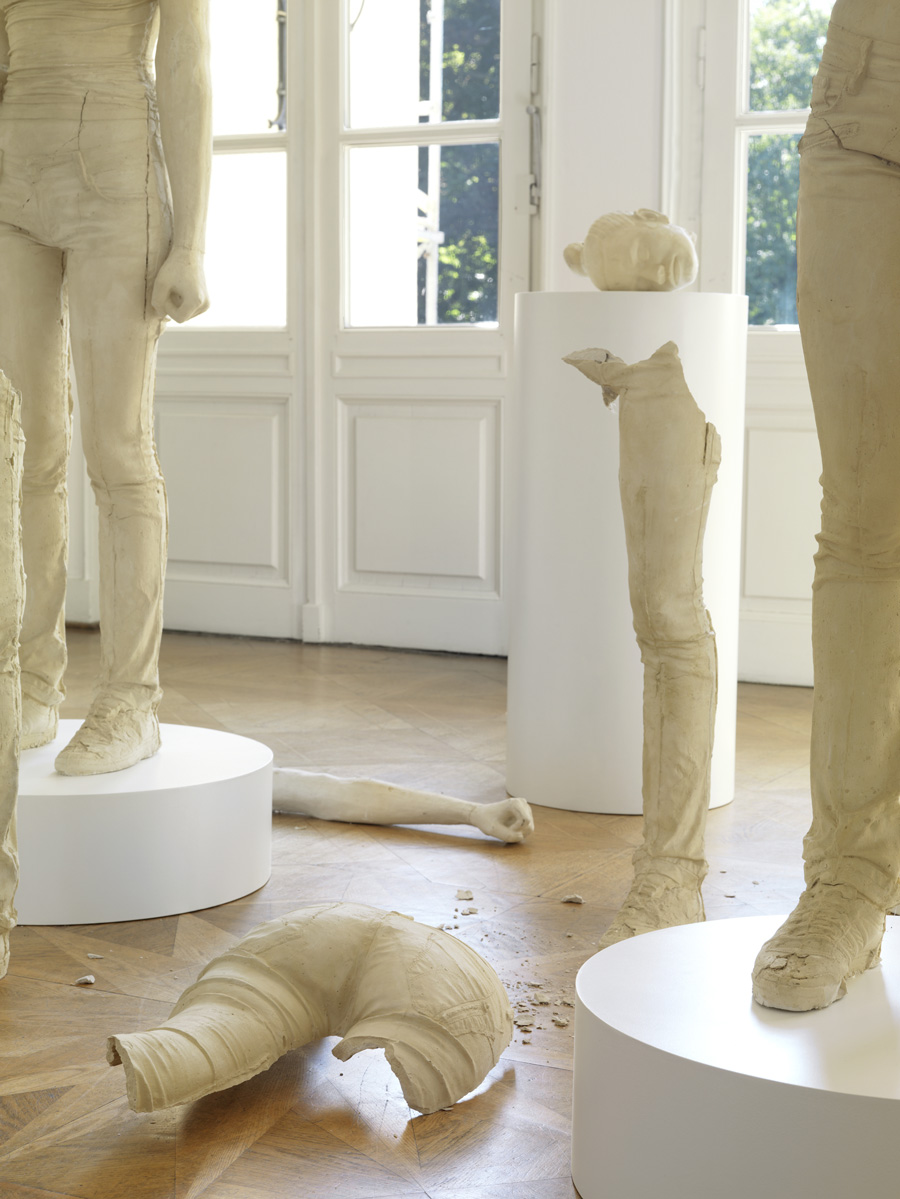
SL Proto-personal, as in before personal or relating to prototype?
SF This is a phrase I made up but like to use because I can’t find another that fits the way I think about or explore the idea of the personal. It relates to the idea of an origin or tradition and to the prototype, that which we all share, a model or blueprint. I like the combination of the words ‘proto-‘ and ‘personal’ because it is somehow a contradiction if we believe that the ‘personal’ is something specific to each person and non-replicable, which is one of the investigations that runs through much of my work: What does personal mean? How much of what we think of as personal is actually specific and how much general? If we all have the same problem is it still a personal problem or a societal problem? Do those terms even apply anymore?
SL I am trying to understand your idea of non-hierarchical history and your conception of fact vs. fiction: So the Iraq War, Nazism, etc. is no more important than someone taking a piss one morning or eating a really great croissant, etc.? I am testing you a bit here, but it seems to me that there is a difference between Facebook and the internet making everything equivalent and these things actually being of equal importance, no? Also, those riots in London did happen, probably for a reasonable reason, right? But the media mostly portrayed the rioters as vandals, just doing it for a laugh—and then you click on a link on Upworthy (which, really, when you think about it, is not that different from changing the channel) and there are some meerkats having sex. So does your piece to your mind mime this equivalence or do something else with it?
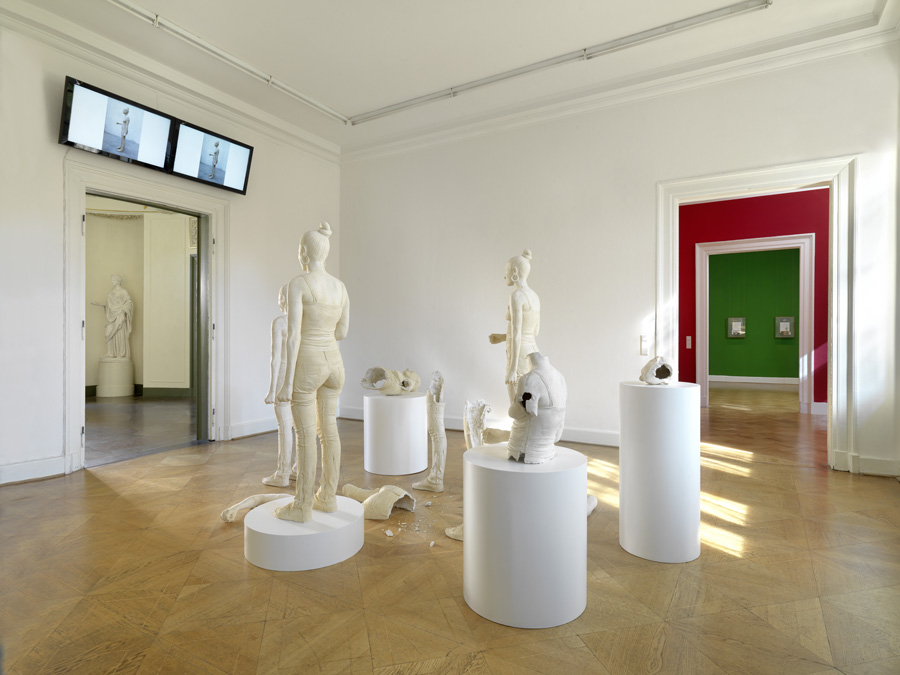
SF I am talking about how stories are told by those in the business of telling stories—in film, art, news—not about individuals talking to each other over tea. The London riots are an example of a history that I saw being written before my eyes. The way the story of the rioters as hooligans with no political agenda was being written by the media and government was extremely calculated but very obvious and it was a narrative the public wanted to hear. I am being a little provocative when I say that the historical facts are equivalent until they are told in a way that interests me, but then I am also in the business of telling stories, so yes I am rarely very excited about mainstream movies, television shows and news from that perspective. Because I am making art I look at things both structurally and emotionally and wonder how much of the emotion is structured and then go down that rabbit hole and, and, in the end, to answer those questions to myself I go to China with Rebekkah, to see what’s new. And it doesn’t answer any questions, it raises some more, but it keeps me occupied for a while and it generates at least something new or another position on something old. I don’t know whether this mimes the equivalence or does something new with it, and I never went into the project with the intention to create an effect in the audience. It never interests me to do this and apart from that this would be the same media control that I work against. So that, while it can ‘look like, smell like’ the media and even tell the story in a similar way, I rely on the fact that the audience are intelligent and critical and therefore know that I can’t be telling the same story as the news or the government because there is the nagging reason of ‘why’ at the base of it. I am not involved and have nothing to lose so why I am involving myself in it? And then you know it is for abstract reasons—for art and ideas. Not politics.
